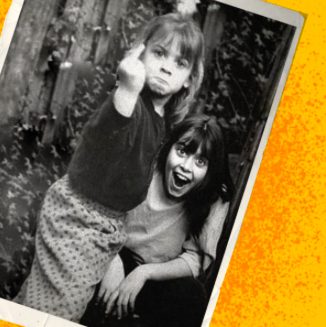This play could just as easily be called ‘Sisterhood’ as Daughterhood so intrinsic is the relationship between siblings Pauline (Charlotte Bate) and Rachel (Charlotte O’Leary) to the narrative. The girls’ father is ill, although the audience never found out with what, only that it’s an illness which can take hold alarmingly quickly and from which there is little to no hope of improvement.
Older sister Pauline has stayed in the family home to care for dad giving up her own hopes and ambitions of entering a world of International Development. Younger by nine years, Rachel has completed her degree and is now trying to make a difference, campaigning in parliament and using social media to bring traction to her cause. They are both caring for their father just in very different ways and they don’t see eye-to-eye about the situation.
During the play the sisters must learn to be more empathetic to the other and so follows a series of flashbacks to various pivotal moments in their lives which show the audience, although not necessarily the other sister, why they are the way they are. These flashbacks often involve another character: mum, dad, a teacher, a lecturer, a family friend, all of whom are played by Toyin Omari-Kinch who is quite sublime at turning his hand to this myriad of parts.
The fact there are no costume changes and no fancy props may seem initially lazy on the part of the production team but it only serves to make the acting shine through even more. All of the performers embody their characters and the audience are immersed in the story, perhaps recognising their own family relationships and crises in Charley Miles script. And the Roundabout venue makes a perfect setting for the actors to sweep in and out and for changes in time and place.
Two daughters who have misunderstood the other for too long must try and find a way to communicate with each other but there is no doubt that Bate and O’Leary certainly connect with their audience in this powerful play.
